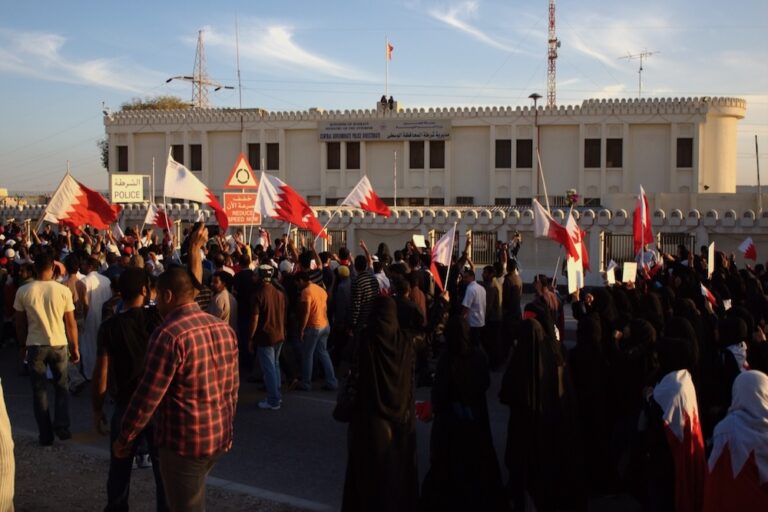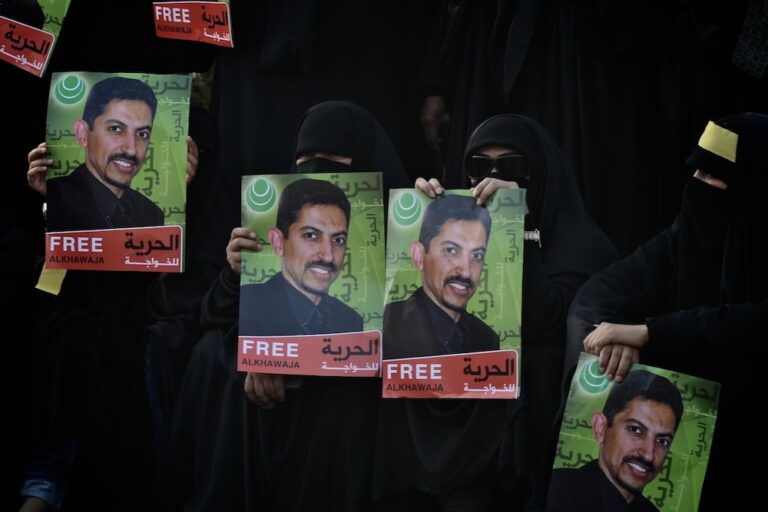The harassment of the Wefaq Society stems from a statement made by its secretary general calling for changes to the country's political structure.
(BCHR/IFEX) – The Bahrain Center for Human Rights expresses its great concern regarding the increasingly deteriorating situation of freedom of opinion and expression in Bahrain following threats made by senior government officials, including the Crown Prince, Prime Minister and Minister of Justice – all of whom are members of the King’s family – against the Wefaq Political Opposition Society. The Wefaq Society is the largest political party in the country, with 17 of a total of 40 MPs.
The actions against the Wefaq Society stem from a statement made by its secretary general, Sheikh Ali Salman, in the society’s most recent general assembly calling for a better distribution of power and an end to the privileges enjoyed by the members of the King’s family in senior positions in the country. This case clearly reveals a denial of the right of Bahraini citizens’ to form their government and the discrimination between citizens in holding public posts, using the law governing political societies to limit freedom of opinion and expression and restrict peaceful political activity. The BCHR was subjected to a similar campaign in 2003 by senior governing officials and was threatened with closure after publishing a report about more than 100 individuals from the King’s family holding the most important political, military, security, judicial and financial posts in the country.
In the speech given at the 18 and 19 February 2010 Wefaq Society conference, the society’s secretary general addressed the need to reform the political regime in Bahrain and create a constitutional monarchy. The secretary general called for an elected government and for a peaceful change of the executive power, while stressing the importance of choosing a prime minister that does not necessarily belong to the ruling family and is of the people. The speech also addressed the discrimination practiced by state institutions, evident in the monopolisation of positions at the heads of ministries and corporations for the benefit of members of the ruling family. The need for a modern constitution legislating a separation of powers by means of free and fair elections, with even distribution of electoral districts, was also highlighted.
In response, the Council of Ministers threatened to use the political societies law – which the Wefaq Society is subject to – to legally pursue the society. The Council of Ministers, the Shura Council (appointed by the King) and some MPs, newspapers and writers affiliated with the authorities condemned what was said in the speech without referring to its content. This coincided with threats by the Minister of Justice to pursue legal action against the society, while the Minister of Culture and Information, Sheikha Mai Al-Khalifa, who is a member of the ruling family, contacted newspaper editors and some news agency correspondents, asking them not to publish any responses from the society to the campaign against it.
The Wefaq Society received overwhelming support in the 2006 elections and now represents the largest parliamentary bloc in the Bahraini Council of Representatives. The society decided to enter the political process in October 2005 by re-registering itself under the umbrella of the political societies law. However, the government continues to indulge in humiliating and pursuing the Wefaq Society’s members, ruining its reputation, challenging its movements and stigmatising it as sectarian through the media which they control. On 30 March 2004, the Minister of Labour and Social Affairs threatened to close down the society if it continued its campaign of demanding constitutional reform, and, subsequently, several members of the society were arrested for initiating a petition for the same aforementioned aim. In 2008, two of the society’s representatives in the Council of Representatives were threatened with imprisonment by the Minister of Interior – who is a member of the ruling family – due to their participation in a conference against discrimination in Geneva and a press conference in the US Congress in Washington D.C. Some of the society’s members have also on occasion been banned from entering neighbouring countries, in a move instigated by the Bahraini security forces.
The BCHR believes that the campaign against the Wefaq Society and its supporting societies reflects an inability to accept criticism. These actions constitute a clear violation of Article 19 of the International Covenant on Civil and Political Rights – endorsed by Bahrain – which states, “everyone shall have the right to freedom of expression; this right shall include freedom to seek, receive and impart information and ideas of all kinds, regardless of frontiers, either orally, in writing or in print, in the form of art, or through any other media of his choice.” The BCHR stresses the importance of the government’s adherence to the international covenants it has endorsed in the field of human rights.
Based on the above, the BCHR demands that the Bahraini Authorities:
– put an end to the campaign against the Wefaq society and its supporting societies and allow freedom of opinion and expression as a fundamental human right of individuals and groups;
– abolish the restrictive political societies law and allow political parties to work freely as part of their political rights, as is outlined in the Universal Declaration of Human Rights and the International Covenant on Civil and Political Rights;
– guarantee the right of citizens to choose their government and ensure equal access to public office as is stated in the international covenants endorsed by Bahrain.


